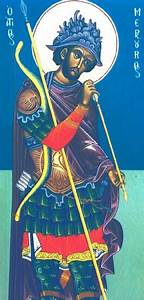Mercurios lived much before Katherine. He lived under the Emperors Decius, Gallus, and Valerian. He came from the land of Anatolia. While he was serving Decius, he and his men came across a horde of Scythians who confronted the borders of the Empire. It was here that an angel revealed himself to Mercurios and prophesied that Mercurios would be put to great tests, but that if he accepted the sword the angel gave him and put his trust in the Lord, victory over the barbarians would be granted unto the holy one. Wielding the sword the angel had given unto him, Mercurios went into battle and began to penetrate deeply into the Scythian lines until he reached their general Regas. Reaching him, the two began to fight in single combat and Mercurios bested Regas causing the Scythians to flee.
Following this victory, the Emperor Decius lavished upon Mercurios great praises, exalting him to become commander-in-chief of the Roman armies, making his name known throughout the lands. Mercurios would sit in the palace alongside the Emperor. But it was in this earthly glory, that the angel returned to him reminding him of the eternal glory he was neglecting. This palace was temporary, yet Mercurios found himself basking in it, neglecting even his eternal virtue. Mercurios needed to remember the promise he gave unto the Lord. After this, Mercurios wept bitterly remembering the words of the angel and what he had promised, and the eternal glory he had been forsaking. He then began to come up with different pretexts to avoid meeting with the Emperor and avoid the praises that the Emperor wished to heap upon him. He was soon accused of insubordination by Catallus who hated Mercurios with a vengeance and wanted to take his place as commander-in-chief.
The Emperor summoned Mercurios and questioned why Mercurios would fail to render thanksgiving to the gods for his victory over the barbarians. Mercurios revealed that it was not the gods of the Emperor who gave him victory, but it was Christ who had given him victory over the barbarians. Mercurios stripped himself of all of his military equipment and decorations and presented himself as naked to the Emperor. The Emperor became hostile toward Mercurios and threw him into prison. Mercurios proclaimed, "I shall combat thee and conquer thy great power, that I might receive from my Master Christ the crown of victory." The Emperor subjected Mercurios to being suspended with ropes over a lit brazier with soldiers rending asunder his flesh with knives. After much torture, Mercurios was so wounded he couldn't even walk to the prison cells. The Emperor's soldiers had to carry his body. The next day, Mercurios showed to the Emperor healed and well-nourished, an angel having visited him in the night. When the Emperor queried, Mercurios revealed that he had been healed by Christ. After many tortures endured, the Emperor, desiring to carry out the rest of the issue swiftly, sentenced Mercurios to be decapitated. Mercurios was crowned with heavenly glory on November 25 at the age of twenty-five. When his relics were discovered, there was an ineffable fragrance of myrrh and incense which emanated from them.
Over one hundred years later, St. Basil the Great, living under Julian the Apostate, had received word that the armies of the Emperor would be returning from their campaigns in Persia soon. He and his congregation gathered together on a mountain in Caesarea where the Church of the Most Holy Theotokos was. St. Basil saw in a vision a Woman enthroned with great glory who commanded him to call upon the intercession of St. Mercurios to slay the enemy of her Son. St. Basil obeyed the Theotokos and called upon the intercession of the Great Martyr. He descended to the mountain and arrived at the Church of the Holy Martyr Mercurios where the relics of this martyr lay, but could not find the relics or the weapons that this holy martyr had used in his life. He questioned the sacristan but the sacristan knew nothing. He then discovered on the night he had visited the relics, June 26, 363 A.D., the ungodly Emperor Julian the Apostate, had been slain while fleeing from the Persians. Julian's death remains a mystery to many who are worldly people, but not to Christians. St. Mercurios, pray for us!

No comments:
Post a Comment